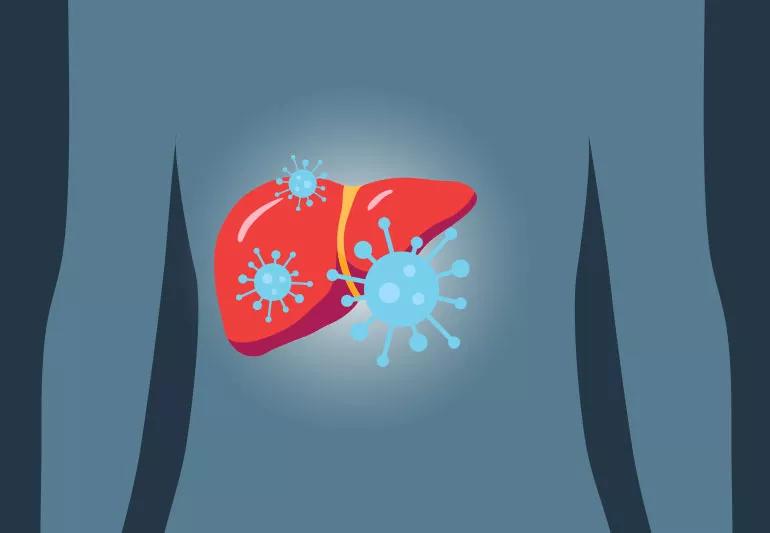Treatment options are better than ever

If a blood test reveals that you have a hepatitis C infection, this can be shocking and unsettling news. You might feel confused, especially if you don’t look or feel sick. You might have no idea how you got it. And you might not have even realized you were at risk to begin with.
Advertisement
Cleveland Clinic is a non-profit academic medical center. Advertising on our site helps support our mission. We do not endorse non-Cleveland Clinic products or services. Policy
The first step is to take a deep breath. Hepatitis C is a potentially serious liver infection, but there are very effective treatments.
“The past five years has really been a revolution in the treatment of hepatitis C,” says liver specialist Christina Lindenmeyer, MD.
It’s also important to know that you’re not alone in this experience. The CDC estimates that nearly 2.4 million Americans live with this disease — and half of them don’t even know it yet, Dr. Lindenmeyer says.
It’s natural to have a lot of questions about what this means for your health and your life and what to expect next. Throughout the process, it’s important to take care of yourself and find support in people you trust.
Hepatitis C is a viral infection that results in chronic inflammation of the liver. It’s spread when blood from an infected person enters the bloodstream of an uninfected person. But, it doesn’t always result in symptoms right away.
Doctors use a blood test called the hepatitis C antibody test to screen for the infection. If your results come back positive on this test, that’s not a diagnosis. That just means you’ve been exposed to the virus at some point.
A follow up test, called the hepatitis C virus RNA PCR test, can confirm whether the infection is active.
Advertisement
In some people, the infection goes away on its own. In other people, it progresses and scar tissue develops on the liver — a process called fibrosis.
Scarring, of course, is not good. It makes it difficult for the liver to do its many jobs, which include metabolizing proteins; filtering the blood; and breaking down, storing and releasing carbohydrates into the bloodstream.
Over time, scarring can lead to cirrhosis, liver cancer or the development of enlarged veins in the esophagus, called portal hypertension.
“Only a subset of patients will develop scarring or cirrhosis,” Dr. Lindenmeyer says. “There’s another subset of patients who will continue to have the infection but will never develop the scar tissue in their liver.”
If you do test positive for hepatitis C on the RNA test, a liver specialist called a hepatologist will want to learn more about the status of your infection and how much scarring is on your liver.
To do this, they will order some more blood tests that can provide insight into how well your liver is working, as well as a noninvasive ultrasound test called FibroScan® to measure scarring in the liver.
These tests are important because people who have little or no scar tissue on their liver are not going to be at risk for complications related to cirrhosis, Dr. Lindenmeyer explains. However, they will still need long-term follow-up with a hepatologist to monitor whether the disease is progressing.
On the other hand, people with cirrhosis need to be regularly screened for liver cancer and portal hypertension.
If you do need treatment for hepatitis C, your doctor will probably prescribe one or a combination of direct-acting antiviral medications. These drugs are highly effective in clearing the hepatitis C virus from the body — studies have shown they have a 98% to 99% cure rate and are generally well tolerated by people who take them.
You’ll take the medications for 8 to 24 weeks and continue to have blood tests to monitor how much of the virus is in your blood during this time.
Some other medications, including some common heartburn medicines, can interfere with these antiviral drugs, so it’s important to make sure you tell your doctor about any and all other medications you’re taking. It’s also important that your doctor has a complete medical history, as some of these medicines could potentially reactivate hepatitis B virus if you’ve been exposed to it in the past.
Hepatitis C is a bloodborne disease, so it’s perfectly safe to share a drink or kiss someone – you can’t spread the infection that way.
To avoid infecting someone else, it’s recommended that you take these steps:
Advertisement
If you have hepatitis C, it’s also important to avoid taxing the liver even more with drugs and alcohol. There is no hepatitis C-specific diet, but it’s good to maintain a healthy diet to keep your liver functioning as well as it can, Dr. Lindenmeyer says.
Once treatment is complete, your doctor will continue to monitor your viral load with blood tests. In some people, the virus relapses a few weeks after treatment ends. “But, if it hasn’t relapsed by three months, we can say confidently that the virus won’t come back,” Dr. Lindenmeyer says. At that point, you would have what’s called a sustained virological response and be considered cured.
But once you’ve been cured, it’s not a guarantee you won’t contract the virus again, Dr. Lindenmeyer notes. There are many strains and mutations of hepatitis C, so it’s important to take the following steps to avoid putting yourself at risk again:
Advertisement
Learn more about our editorial process.
Advertisement

It’s not just smoking and genetics that can increase your risk of cancer

Most recommended precautions center around minimizing bruising or swelling

Even one drink can have an impact on your cognitive function leading to slurred speech, blurred vision and impaired memory

Understand who may (and may not) benefit

Lorem ipsum dolor sit amet. Et odio Quis vel ipsam omnis eum alias deleniti et placeat impedit non voluptas galisum hic autem enim et cupiditate aliquid. Est beatae quidem non facilis autem ut commodi nisi aut tempore rerum et dolores voluptatem cum enim optio id sapiente quasi. Ad laboriosam officiis 33 cupiditate sequi ea voluptatum consectetur qui necessitatibus voluptate et quasi doloremque et facere explicabo quo explicabo officia

Seeking help through therapy can be an important step in improving your quality of life when you have UC

Type 2 diabetes isn’t inevitable with these dietary changes

Applying a hot or cold compress can help with pain